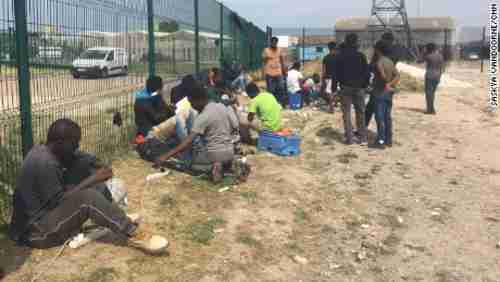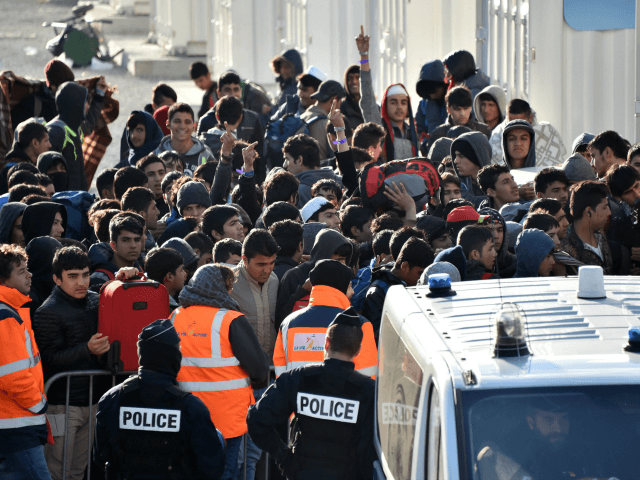This morning’s key headlines from GenerationalDynamics.com
- Court orders France to provide water and sanitation to Calais migrants
- French police accused of abusive treatment towards Calais migrants
Court orders France to provide water and sanitation to Calais migrants

Migrants are continuing to arrive in Calais, despite the closure of the Jungle camp nine months ago. (CNN)
Under court order, France’s government said that it would provide hundreds of refugees “sleeping rough” in the Calais region with drinking water, showers, and toilets.
In October of last year, France finally closed “The Jungle,” the refugee camp housing about 7,000 refugees in the French port city of Calais, hoping to sneak onto ferries and trucks crossing the English Channel, in order to apply for asylum in Britain.
France had hoped to be done with “The Jungle,” but now hundreds of new refugees have come to Calais with the same goals. One Afghan refugee said that this year it’s different:
The difference is huge compared to the former ‘Jungle,’ police were not harassing people every day. There were houses, tents set up, there was food. We had everything there.
There were showers, toilets, a mosque and even a place for eating. We had everything. Here, there is nothing, no toilet, no shower, nowhere to sleep. Not even a plate to eat from.
In June, a regional court ordered Calais officials, within ten days, to provide drinking fountains, toilets, and showers to migrants who are “exposed to inhuman and degrading conditions” in the area. The court said that Calais did not have to provide shelter to migrants on a permanent basis, but said it was “unlawful to deny all aid to people who are in a state of complete deprivation.” The court said that if Calais failed to comply, then the city would be fined €100 per day.
The ruling was hailed as a victory by migrants’ rights activists, but Calais chose not to comply, with the mayor reportedly saying that he would rather pay a €100 per day fine than risk having thousands of migrants come back to Calais.
Interior minister Gérard Collomb warned that complying with the order risked developing a migrant “abscess.”
We’ve seen this before, it starts with a few hundred people and ends with several thousand people who we can’t manage. That’s why we don’t want a center here.
So on Monday, France’s highest administrative court, the e Council of State or Conseil d’État, upheld the lower court order, and ordered the state to provide running water and sanitation for the migrants, saying that its refusal so far to do so “exposed them to inhuman and degrading treatment.”
Calais Mayor Natacha Bouchart said that she would ignore the order:
The decision by the Council of State is unfair to the people of Calais because it threatens them with the emergence of yet another Jungle.
In the absence of a national and European policy offering a global solution on controlling immigration, Calais will not implement the injunctions.
Instead, Interior minister Gérard Collomb announced on Monday that two shelters for Calais migrants, each with a capacity of 300, would be opened within ten days. The centers will be located in the towns of Troisvaux and Bailleul, situated about 80 kilometers from Calais. Furthermore, refugees will only be permitted to remain there for a few days, to allow their asylum applications to be processed, and then they would be required to leave and go somewhere else. Whether that will satisfy the court remains to be seen.
But Calais’s mayor, Natacha Bouchart, called Collomb’s plans “an injustice to the people of Calais,” and said the plans would lead to a new Jungle. Euro News and RFI and France 24 (26-June) and Express (London)
French police accused of abusive treatment towards Calais migrants
For months, NGOs and activists have been accusing French police of use of abusive treatment and excessive force towards migrants in Calais. Police were accused of preventing aid groups from distributing meals in Calais.
According to regional police chief Fabien Sudry in June, the charges were unfounded:
In a country with the rule of law, all people can file a legal complaint and ask for an investigation from the police inspector general. No legal complaints have been filed at this stage regarding police violence on migrants.
Now Human Rights Watch has produced a report based on interviews with 60 asylum seekers and migrants, confirming the reports of police abuse. According to the report:
Human Rights Watch finds that police in Calais, particularly the riot police (Compagnies républicaines de sécurité, CRS), routinely use pepper spray on child and adult migrants while they are sleeping or in other circumstances in which they pose no threat; regularly spray or confiscate sleeping bags, blankets, and clothing; and sometimes use pepper spray on migrants’ food and water. Police also disrupt the delivery of humanitarian assistance.
According to HRW, authorities have turned a blind eye to these widespread reports of police abuse against asylum seekers and other migrants. According to HRW’s director in France: “It is reprehensible for police to use pepper spray on children and adults who are asleep or peacefully going about their day. When police destroy or take migrants’ blankets, shoes, or food, they demean their profession as well as harm people whose rights they’ve sworn to uphold.” Human Rights Watch and European Observatory of Crimes and Security and Reuters (1-June) and Daily Sabah (Ankara)
Related Articles
- France struggles with hundreds of migrants returning to Calais campground (30-Jun-2017)
- Migrant camp in northern France housing 1,600 people burnt to the ground (12-Apr-2017)
- Thousands of refugees hide from French police as Calais ‘Jungle’ refugee camp is demolished (28-Oct-2016)
- France to demolish ‘The Jungle’ migrant camp in Calais (22-Oct-2016)
KEYS: Generational Dynamics, France, Calais, The Jungle, Natacha Bouchart, Gérard Collomb, Fabien Sudry
Permanent web link to this article
Receive daily World View columns by e-mail

COMMENTS
Please let us know if you're having issues with commenting.